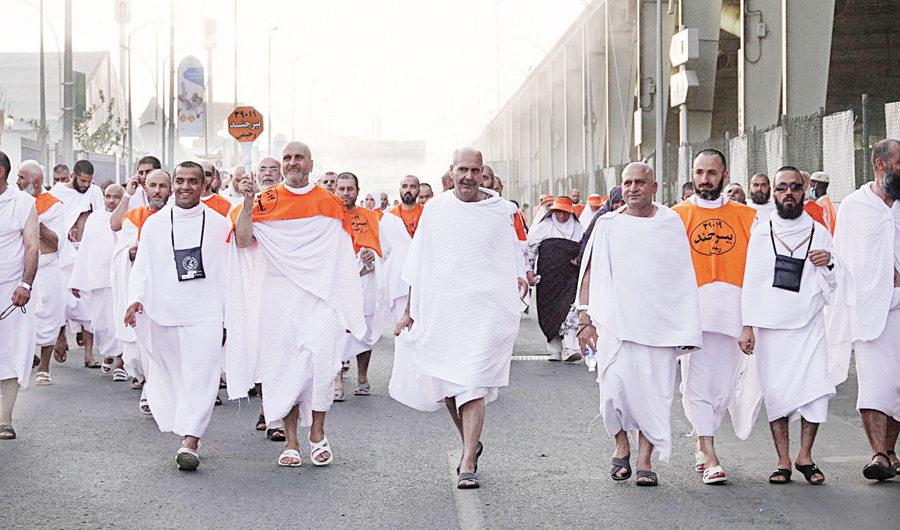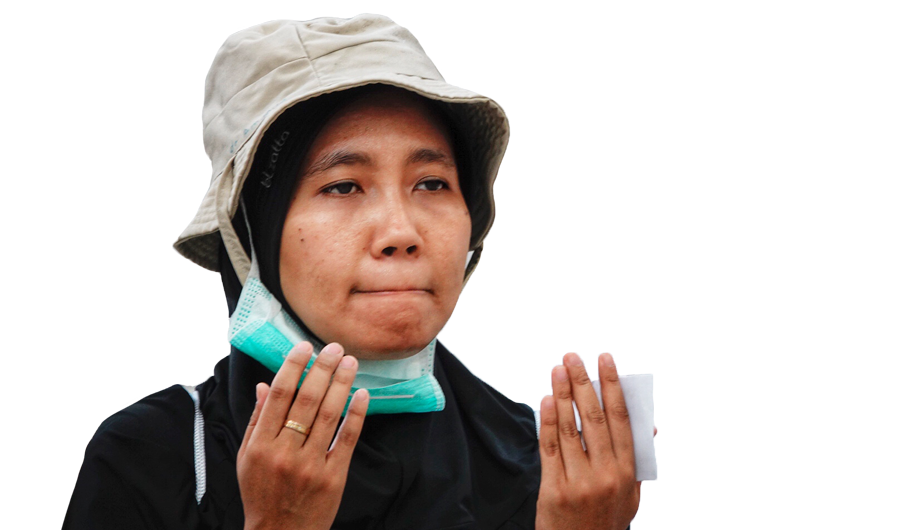JEDDAH: The coronavirus (COVID-19) pandemic has forced the postponement or cancellation of countless events and activities around the globe, causing great disappointment for many people.
Among them are hundreds of thousands of Muslims who, after saving and planning for years, will miss out on what is for many the once-in-a-lifetime experience of performing Hajj.
The Saudi Ministry of Hajj and Umrah announced in June that it is severely limiting the number of pilgrims this year to preserve global public health in the face of the ongoing coronavirus threat.
The move prompted the governments of Muslim-majority countries and Hajj authorities across the world to cancel the pilgrimage for their intending pilgrims.
In recent years, more than 2 million pilgrims have performed Hajj. This year, only people who already reside in Saudi Arabia will be allowed to take part, but even then the number of places will be strictly limited to a few thousand. Of those, 70 percent will be expats and 30 percent Saudi citizens.

As a result, many Saudis who have been fortunate enough to perform the fifth pillar of Islam many times will be unable to do so this year.
“I feel so pleased and gifted for having the chance to perform Hajj 22 times in my life,” said Wafa Shaheen, a Saudi author with a master’s degree in the scientific exegesis of the Qur’an. “I could not be more grateful to Allah.
Limiting the number of pilgrims is a sensible precaution and a welcome step to protect people’s health.
Wafa Shaheen
“I was not upset by the Hajj news this year as I know there are plenty of ways to take advantage of this precious spiritual time of the year. Worship and good deeds can be performed anywhere if the heart is with God almighty.”
She added that limiting the number of pilgrims is a sensible precaution and a welcome step to protect people’s health.
Abdulrahman Abdulkhaliq is a Saudi citizen who works as a chemical engineer who has volunteered to help pilgrims for more than 10 years. He said that Hajj is one of the most exciting activities he participates in and he looks forward to it every year.
“I cannot imagine that this Hajj season will pass and I will not be there,” he said. “This year’s Hajj is a challenge and we will learn a lot from it for future Hajj seasons.”
After months of preparation, many Malaysian pilgrims were left disappointed that the Hajj this year has been canceled, but they expressed their full understanding of the decision.
Samsiah Muhammad, a 62-year-old retiree, told Arab News that she was devastated to find out she would be unable to perform her pilgrimage but said that “this isn’t anyone’s fault.”
For Wan Mohamad Ali Wan Idrus, the cancellation was a blessing in disguise as he was already considering canceling his pilgrimage.
“My letter informing me that I was shortlisted arrived on Jan. 30. I got my first offer to perform my Hajj in 2009 along with my family but I had to turn it down,” the 26-year-old told Arab News.
This year, 31,600 Malaysians were shortlisted to perform the pilgrimage. A Malaysian official said the government would prioritize their applications in next year’s Hajj season.
Malaysian pilgrims are subsidized by the government and pay $2,340 per person for the journey and Hajj preparation courses.
In many countries, even people who can afford the expense of traveling to Makkah often wait years to be included in their country’s quota of pilgrims, set by Saudi Arabia to equalize the opportunity for Hajj across Muslim countries.
FASTFACTS
• In recent years, more than 2 million pilgrims have performed Hajj.
• This year, 31,600 Malaysians were shortlisted to perform the pilgrimage.
• Pakistan’s quota for this year’s Hajj was 179,210 pilgrims.
• Nearly 30,000 Afghans were shortlisted to perform the annual pilgrimage.
Pakistan’s quota for this year was 179,210 pilgrims.
Sanaullah Khan, 52, is one of 2.5 million Muslims globally, almost 180,000 from Pakistan, whose plans were upended when Saudi Arabia restricted this year’s Hajj event to only 1,000.

“I felt as if the sky had fallen down the day I got the phone call from the bank asking me to collect the pilgrimage deposit of Rs463,000 ($2,760),” the farmer from the impoverished town of Gomal on the edge of the South Waziristan tribal district told Arab News.
Soon, news reached relatives and neighbors, and the whole community of Gomal poured into Khan’s home to offer condolences and pray that his dream come true next year.
Perhaps Hajj was not written in my destiny this year, we might as well help the needy people and this in itself is similar to going on Hajj.
Tajuddin Sangarwal
Last year, too, Khan was all set to go but withdrew his Hajj application at the last minute so his ailing brother could travel instead.
Khalid Anwar, a government employee and Khan’s neighbor, said he had twice visited his friend to offer condolences and “to explain that the pandemic affected millions of intending pilgrims, not only him.”
But for the aging Khan, missing Hajj this year is an inconsolable blow.
“My only wish at this age is to visit Makkah and Madinah,” Khan said, “If I am still alive and can still afford it.”
Sehzad Husain, 39, a London-based businessman, was planning to perform Hajj this year with his wife Aziza Husain, 38, an assistant headteacher at a primary school in the British capital.
Husain told Arab News that they booked their Hajj packages in January and paid for them in full because they were “extremely happy” at having the opportunity to perform the pilgrimage and were determined to go.
This year, the price of Hajj packages in the UK ranged between £5,500 ($7,003) and £13,000 depending on a range of factors including how far hotels are from the holy sites, meals included, type of package and services offered within them.
“I feel very sad at not being able to perform Hajj this year,” Sehzad said. “Initially I was very excited about performing Hajj and was looking forward to it. I’d already started making preparations.”
I felt as if the sky had fallen down the day I got the phone call from the bank asking me to collect the pilgrimage deposit.
Sanaullah Khan
He said they were still optimistic about performing Hajj even as coronavirus cases started to increase in the UK.
“We were hearing rumors that a limited number of people from each country would be able to perform Hajj. We were confident that we’d be among those people as we’re young, fit, and healthy, and we’d paid for our packages in full already. We were prepared to pay extra if the price increased,” he added.
Husain described the disappointment that he and his wife felt when it was announced that overseas Muslims would not be able to take part. An Afghan man is using his time and Hajj savings to help poor people in his home country, following Saudi Arabia’s decision.
“Perhaps Hajj was not written in my destiny this year, we might as well help the needy people and this in itself is similar to going on Hajj,” Tajuddin Sangarwal told Arab News.
The 42-year-old resident of Logar, south of Kabul, added that the pandemic had left people jobless with a majority struggling to make ends meet.
“Based on information from preachers in mosques and radios, people in different parts of Afghanistan have been badly affected by coronavirus and (therefore), we have decided to help them in whatever way we can.”
Himat Shah, a tribal elder from Samangan province in northern Afghanistan, said: “God does not need our Hajj or worshipping, but he loves if we give charity to people, helping them to reduce their poverty and hunger.”
Sangarwal and Shah are not alone. With the pilgrimage canceled for the nearly 30,000 Afghans who constitute the Hajj quota, people from Logar and across the country are engaging in charitable deeds.
With inputs from:
Nada Hameed Jeddah
Ushar Daniele Kuala Lumpur
Rehmat Mehsud Peshawar
Zaynab Khojji London
Sayed Salahuddin Kabul




























